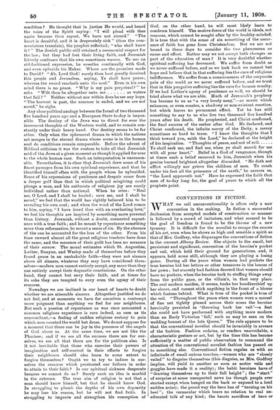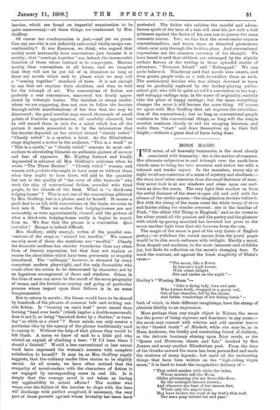CONVENTIONS IN FICTION.
WHAT we call unconventionality is often only a new convention in the making. In fiction a successful declension from accepted models of construction or manner is followed by a crowd of imitators, and what seemed to be the goal of freedom is found to be the throne of a new tyranny. It is difficult for the novelist to escape the snares of his art, even when he shows as high and sensible a spirit as that of Mrs. Godfrey, who disparages the conventions of fiction in the current Albany Review. She objects to the small, but persistent and significant, convention of the heroine's pocket and veil, which held their ground for generations, and, it appears, hold some still, although they are playing a losing game. During all the years when women had pockets the true heroine hid her letters or other treasures in the bosom of her gown ; but scarcely had fashion decreed that women should have no pockets, when the heroine took to stuffing things away from the public gaze, or the villain's, in that very place. The real modern maiden, it seems, tucks her handkerchief up her sleeve, and cannot stick anything in Ihe front of a blouse which fastens behind. What is true of the pocket is true of the veil. "Throughout the years when women wore a morsel of fine net tightly pinned across their noses the heroine heroically persisted in throwing back her veil '—a feat she could not have performed with anything more modern than an Early Victorian fall,' such as may be seen on the wedding-bonnet of n the. late Queen." The rule appears to be that the conventional should be invariably in arrears
of the fashion. Fashion ordains, or renders unavoidable, a characteristic gesture or act, but by the time this has become sufficiently a matter of public observation to command the attention of the conventional novelist fashion has passed on to something else. Conventional fiction regales us with an infinitude of small untrue touches,—women who are "closely veiled" to disguise themselves (this disguise, as Mrs. Godfrey implies, will yield to another as soon as motor veils and goggles have made it a reality); the habit heroines have of "drawing themselves up to their full height" ; the " start " of surprise at some unexpected news (as though people ever started except when banged on the back or exposed to a loud sudden noise); the proud way the hero has of "turning on his heel "; the vernacular which bears no relation to real un- educated talk of any kind ; the heroic sacrifices of hero -or heroine, which are found on impartial examination to be quite unnecessary,—all these things are condemned by Mrs.
godfrey. . • . Of course her condemnation is just,—and yet we pause. Can any one who is not definitely anti-social wholly escape con- ventionality,?. It was Emerson, we think, who argued that society must necessarily have conventions just because it is society; that "comings together" are, indeed, the irremovable function of those. whose instinct is to congregate. Human society likes conventions in all forms, and we imagine that they will not be got rid of in literature so long as there are novels which seek to please what we may call
"coming together" standard of taste. It is not enough to say that art requires their abolition, and then to wait for the triumph of art. The conventions of fiction are probably a real convenience, unavowed but firmly appre- ciated by lethargic brains. The indolent or sleepy reader, whom we are supposing, does not care to follow the heroine through subtle manifestations of her fear that she may be d,iscovered ; the good novelist may record thousands of small points of feminine apprehension, all carefully observed, but he will record them in vain for a mind which has all the picture it needs presented to it by the information that the heroine departed on her critical errand "closely veiled." "Closely veiled" is a symbol, a label. As the Elizabethan stage displayed a notice to the audience, "This is a wood" or "This is a castle," so "closely veiled" conveys to most sub- scribers to. circulating libraries an authentic picture of secrecy and fear of exposure. Mr. Kipling foresaw and kindly deprecated in advance all Mrs. Godfrey's criticism when he wrote "The Three Decker." "Closely veiled" women, and women with pockets who ought to have none or without them when they ought to have them, will add to the quantity but not to the quality of "the crew of able bastards" who work the ship of conventional fiction, crowded with tired people, to the islands of the blest. What is "a third-rate lodging-house" ? This is not one of the conventions pilloried by Mrs. Godfrey, but is a phrase used by herself. It means a good deal to us till, with conventions on the brain, we come to look into it. Then we realise that lodging-houses are not accurately, or even approximately, classed, and the picture of what a third-rate lodging-house really is begins to recede from us. We fear that the phrase is a convention. Quis custodiet ? Escape is indeed difficult.
Mrs. Godfrey, oddly enough, writes of the parallel con- ventions of the stage as "absurd but needful." We cannot see .why most of those she mentions are "needful." Clearly the dramatic medium has stricter boundaries than any other form of literary expression, but that does not explain or excuse the absurdities which have been perversely or stupidly introduced. The "soliloquy," however,-is shunned by every competent modern playwright, and the only dramatists who count allow the action to be determined by character, not by an ingenious arrangement of doors and windows. Crises in the lives of men can never be the result of the mere geography of rooms, and the fortuitous coming and going of particular persons whose impact upon their fellows is in no sense temperamental.
But to return to novels ; the blame would have to be shared by hundreds of the phrases of common talk and writing out- side fiction. Is "turning on one's heel" more unreal than turning "head over heels" (which implies a double somersault, does it not ?), or being "knocked down by a feather," or turn- ing "as white as a sheet " ? Some minds can only receive a particular idea by the agency of the phrase traditionally used to convey it. Withoul7 the help of that phrase they would be left blank. A nurse we know of said to a little girl who related an exploit of climbing a tree: "If I'd been there I should a' fainted." Would a less conventional or less unreal word have expressed the woman's concern with complete satisfaction to herself ? It may be, as Mrs. Godfrey sagely suggests, that the ordinary reader likes stories to be slightly unreal. At all events, we have often noticed that the sympathy of novel-readers with the characters of fiction is not engaged by corresponding cases in real life. • Is it simply that the average novel is not taken as having any applicability to actual affairs P The mother who weeps over the failure of the heroine to elope with the .hero will discharge with perfect. sangfroid, if necessary, the very part of those- parents against whose brutality her tears have protested. The father who relishes the manful and adven- turous spirit of the hero of a tale will shut his jaw with a dull grimness against the desire of his own son to pursue the same romantic course. Yes ; we fear that the novel-reader expects conventionalities, and treats them as detached phenomena which exist only through the looking-glass. And conventional expressions are the common currency of his thought. We have heard it said that children are estranged by the slightly archaic flavour of the writing in those splendid "stories of adventure, "Treasure Island" and "Kidnapped." We can quite believe it. Thackeray said that novels were sweets, and even grown people wish, as a rule, to swallow them as such. The sentimental heroine who was always drowned in tears may be gradually replaced by the hockey-playing public. school girl, who will be quite as solid a convention in her way; and unhappy endings may, in the name of originality, entirely take the place of happy endings; but the more everything changes the more it will become the same thing. Of course we agree with Mrs. Godfrey that art requires the subordina- tion of the conventional ; but so long as conventional people continue to like conventional things, so long will the simple novelist continue closely to veil his escaping heroines, and make them "start" and draw themselves up to their full height,—without a great deal of harm being done.











































 Previous page
Previous page